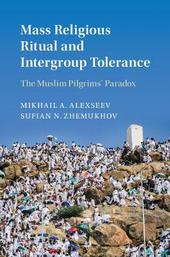
|
Mass Religious Ritual and Intergroup Tolerance: The Muslim Pilgrims' Paradox
Hardback
Main Details
| Title |
Mass Religious Ritual and Intergroup Tolerance: The Muslim Pilgrims' Paradox
|
| Authors and Contributors |
By (author) Mikhail A. Alexseev
|
|
By (author) Sufian N. Zhemukhov
|
| Series | Cambridge Studies in Social Theory, Religion and Politics |
|---|
| Physical Properties |
| Format:Hardback | | Pages:240 | | Dimensions(mm): Height 236,Width 157 |
|
| Category/Genre | Interfaith relations
Islam |
|---|
| ISBN/Barcode |
9781107191853
|
| Classifications | Dewey:297.3524 |
|---|
| Audience | | Professional & Vocational | |
|---|
| Illustrations |
Worked examples or Exercises
|
|
Publishing Details |
| Publisher |
Cambridge University Press
|
| Imprint |
Cambridge University Press
|
| Publication Date |
14 July 2017 |
| Publication Country |
United Kingdom
|
Description
Under what conditions does in-group pride facilitate out-group tolerance? What are the causal linkages between intergroup tolerance and socialization in religious rituals? This book examines how Muslims from Russia's North Caucuses returned from the Hajj pilgrimage to Mecca both more devout as Muslims and more tolerant of out-groups. Drawing on prominent theories of identity and social capital, the authors resolve seeming contradictions between the two literatures by showing the effects of religious rituals that highlight within-group diversity at the same time that they affirm the group's common identity. This theory is then applied to explain why social integration of Muslim immigrants has been more successful in the USA than in Europe and how the largest Hispanic association in the US defied the clash of civilizations theory by promoting immigrants' integration into America's social mainstream. The book offers insights into Islam's role in society and politics and the interrelationships between religious faith, immigration and ethnic identity, and tolerance that will be relevant to both scholars and practitioners.
Author Biography
Mikhail Alexseev is Professor of Political Science at San Diego State University. He is the author of Immigration Phobia and the Security Dilemma (Cambridge, 2006), Center-Periphery Conflict in Post-Soviet Russia (1999), and Threat Assessment, Intelligence, and Global Struggle (1997). Sufian N. Zhemukhov is Senior Research Associate at George Washington University, Washington DC and Lecturer of History of Islam at University of Maryland, Baltimore. He is co-author of Putin's Olympics: The Sochi Games and the Evolution of Twenty-First Century Russia (2017, with Robert Orttung).
Reviews'Alexseev and Zhemukhov have written a beautiful book. Combining political science's trademark rigor with the depth of insight characteristic of historical ethnography, the authors document how a ritual that exposes someone intensely to the diversity of their own large group can also generate pro-social attitudes toward members of other groups - even in sites of ongoing conflict. Filled with fascinating personal stories and insight about Russia's North Caucasus and Islam, the book gives cause for optimism regarding the human condition more generally.' Henry E. Hale, George Washington University, Washington DC 'The standard narrative about 'radicalization' draws a straight line between religious fervor and political action. But in this truly pathbreaking study, two prominent experts demonstrate the opposite: that the experience of going on a pilgrimage to Muslim holy sites can lead to more tolerant attitudes when pilgrims return home. I hope that every student of religion, sociology, and political science reads this book - and that journalists and global policymakers take note of these vital findings about how many Muslims actually practice their faith.' Charles King, Georgetown University, Washington DC 'In this unusual book two co-authors with different academic, cultural, and religious backgrounds set out to directly explore the Islamic Hajj pilgrimage, a major collective ritual practiced by humans. They go beyond the classical Durkheimian insight that rituals generate social solidarity and demonstrate, empirically as we as theoretically, that such solidarity could even transcend the boundaries of religion itself.' Georgi Derluguian, New York University, Abu Dhabi
|